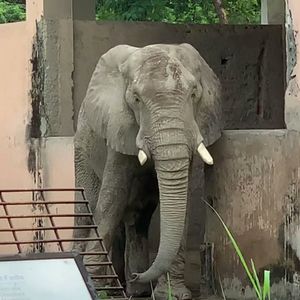Shankar (elephant): Difference between revisions
mNo edit summary |
mNo edit summary |
||
| Line 1: | Line 1: | ||
{{Infobox animal|species=African elephant|gender=Male|birth_date=1996|birth_place=Africa|residence=Delhi Zoo, India|image=Shankar Elephant.jpg|alt=Shankar the elephant at Delhi Zoo, India. Photo: Nikita Dhawan|caption=Shankar the elephant at Delhi Zoo, India. Photo: Nikita Dhawan|name=Shankar}} | {{Infobox animal|species=African elephant|gender=Male|birth_date=1996|birth_place=Africa|residence=Delhi Zoo, India|image=Shankar Elephant.jpg|alt=Shankar the elephant at Delhi Zoo, India. Photo: Nikita Dhawan|caption=Shankar the elephant at Delhi Zoo, India. Photo: Nikita Dhawan|name=Shankar}} | ||
In 1998, an [[elephant]] aged 2 was captured in Africa and presented as a diplomatic gift to the Minister of State for Environment & Forests, Shri Babu Lal Marandi in India by the High Commissioner of Zimbabwe. Shri Babu Lal Marandi named the young elephant "Shankar". | In 1998, an [[elephant]] aged 2 was captured in Africa and presented as a diplomatic gift to the Minister of State for Environment & Forests, Shri Babu Lal Marandi in India by the High Commissioner of Zimbabwe. Shri Babu Lal Marandi named the young elephant "Shankar". | ||
Revision as of 17:46, 8 May 2023
 Shankar the elephant at Delhi Zoo, India. Photo: Nikita Dhawan | |
| Species | African elephant |
|---|---|
| Sex | Male |
| Born | 1996 Africa |
| Captive at | Delhi Zoo, India |
In 1998, an elephant aged 2 was captured in Africa and presented as a diplomatic gift to the Minister of State for Environment & Forests, Shri Babu Lal Marandi in India by the High Commissioner of Zimbabwe. Shri Babu Lal Marandi named the young elephant "Shankar".
Shankar is chained for 17 hours of the day and does not have adequate space to move around when he is let out. He constantly demonstrates stereotypical behaviour like swaying and head-bobbing, a key sign of distress. His aggressive behaviour has necessitated the zoo authorities to permanently close the viewing pathway since he could be a danger to visitors.[1]
See also
External links
- Youth For Animals
- Teen makes plea to relocate Shankar the elephant from Indian zoo ABC News
- Elephants living alone in zoos around the world The Animal Reader
- Plea to send lonely African animal home from India BBC
- Elephants in Zoos: A Legacy of Shame Born Free
- Copy Of The Letter Addressed To: The Director Of The National Zoological Park In Delhi 29th October 2021 Pro Elephant Network
- Teen makes plea to relocate Shankar the elephant from Indian zoo YouTube
- INTERVIEW: African elephant Shankar extremely lonely at Delhi zoo YouTube
- Episode 7: Freeing Shankar The Think Wildlife Podcast
- Youth For Animals All About Animals Radio
- Voices Carry For Animals #360 Youth for Animals (YFA) Blog Talk Radio
References
- ↑ Help free Shankar from decades of solitary confinement in the Delhi Zoo Youth For Animals
